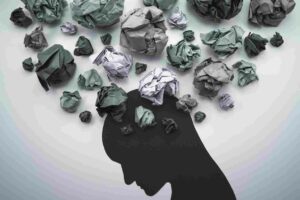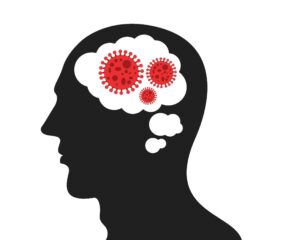If you are someone who has been diagnosed with complex PTSD, it is important that you understand all of the symptoms you may be experiencing. Complex PTSD can be very debilitating, and it is important to get the help you need in order to manage your symptoms. This blog post will discuss some of the most common complex PTSD symptoms, as well as strategies for managing them.
Contents
- 1 What Is Complex PTSD?
- 2 Top 15 Complex PTSD Symptoms
- 2.1 Lack of emotional regulation
- 2.2 Hyperarousal
- 2.3 Re-living trauma
- 2.4 Avoiding people and places
- 2.5 Intrusive thoughts and flashbacks
- 2.6 Isolation
- 2.7 Difficulty trusting
- 2.8 Anger
- 2.9 Worthlessness
- 2.10 Self-hatred
- 2.11 Dissociation
- 2.12 Overly vigilant
- 2.13 Difficulty concentrating
- 2.14 Lack of sleep
- 2.15 Easily overwhelmed or stressed
- 3 Consequences
- 4 How To Manage Complex PTSD Symptoms?
- 5 Conclusion
What Is Complex PTSD?
 Complex PTSD is a type of post-traumatic stress disorder. It can occur after you experience long-term or repeated trauma, such as domestic abuse, sexual assault, or childhood abuse. Complex PTSD is also known as complex trauma or developmental trauma.
Complex PTSD is a type of post-traumatic stress disorder. It can occur after you experience long-term or repeated trauma, such as domestic abuse, sexual assault, or childhood abuse. Complex PTSD is also known as complex trauma or developmental trauma.
The term complex PTSD was first used in the late 1980s by psychiatrist Judith Herman. She suggested that PTSD could be divided into two types:
- Type I, which she called “classic PTSD,” and
- Type II, which she called “complex PTSD.”
Complex PTSD is less well-known than classic PTSD, but it’s becoming more recognized as a distinct disorder. It’s thought to be more common than classic PTSD, although it’s still underdiagnosed. The reason behind this is likely because complex PTSD symptoms are often mistaken for other mental health conditions, such as borderline personality disorder (BPD) or major depressive disorder (MDD).
But there are diagnoses available. In fact, Judith Herman, in her book “Trauma and Recovery” proposed a set of diagnostic criteria for complex PTSD. So it is possible to get an accurate diagnosis and further a treatment plan for your condition.
Top 15 Complex PTSD Symptoms
At first, it may be difficult to recognize the complex PTSD symptoms but, with time and understanding, the symptoms will become more clear. Here are the top 15 complex PTSD symptoms:
Lack of emotional regulation
This is one of the most common complex PTSD symptoms and refers to the inability to control or express emotions. Those with complex PTSD may experience extreme mood swings, and feel detached from their emotions. For example, they may feel numb or have trouble crying when they are upset.
Hyperarousal
This symptom refers to the feeling of being on edge all the time. It simply means that your body is in a state of constant fight-or-flight mode. You might feel like you’re always on the lookout for danger and that you can’t relax. You might also find yourself being easily startled or having difficulty concentrating. For example, you might have trouble sleeping because you can’t quiet your mind.
Re-living trauma
People with complex PTSD might be constantly haunted by bad memories of the past. They might have nightmares or flashbacks where they relive the trauma over and over again. This can make them feel like they’re going crazy. For example, a rape victim might see her attacker’s face every time she closes her eyes. Or a war veteran might hear the sound of gunfire in his head long after he’s left the battlefield.
Avoiding people and places
People with complex PTSD might start to avoid anything that reminds them of the trauma they experienced. This can include people who were involved in the traumatic event, places where the event happened, and any activities that might trigger memories of the trauma. For example, a survivor of sexual assault might avoid being in crowds or being alone with someone they don’t know well.
Intrusive thoughts and flashbacks
 One of the most common symptoms of complex PTSD is intrusive thoughts and flashbacks. This can be extremely distressing and can make it difficult to go about your everyday life. You may find yourself reliving the traumatic event over and over again, or you may have sudden, vivid memories of the event that come out of nowhere. These thoughts and images can be so distressing that you may start to avoid things that remind you of the trauma, or you may try to numb yourself by drinking alcohol or using drugs.
One of the most common symptoms of complex PTSD is intrusive thoughts and flashbacks. This can be extremely distressing and can make it difficult to go about your everyday life. You may find yourself reliving the traumatic event over and over again, or you may have sudden, vivid memories of the event that come out of nowhere. These thoughts and images can be so distressing that you may start to avoid things that remind you of the trauma, or you may try to numb yourself by drinking alcohol or using drugs.
Isolation
When you have complex PTSD, you may feel cut off from the outside world. You may find it hard to trust people and build close relationships. This can leave you feeling alone and disconnected. For example, you may feel that you’re different from other people. And no one can understand what you’re going through.
During isolation, these feelings are normal. You may feel like you’re in survival mode and that you can’t let your guard down. But it’s important to reach out for help and support. There are people who understand what you’re going through and can offer assistance.
Difficulty trusting
People who have complex PTSD symptoms often have a hard time trusting people. They may feel like they can’t trust anyone, even people who are close to them. This can make it difficult to have healthy relationships. But there is no mistake of yours, you are just more careful now. Moreover, difficulty trusting people is also common with regular PTSD. Because of the trauma you experienced, it is hard to trust again. You may be feeling like you need to protect yourself all the time and that makes it hard to let people in.
Anger
Another complex PTSD symptom is anger. This may be directed at yourself, the person who hurt you, or even at innocent people who had nothing to do with your trauma. You may find yourself feeling angry all the time, or you may have sudden outbursts of anger that seem to come out of nowhere. If you have trouble controlling your anger, it can lead to problems in your personal and professional life.
Worthlessness
It is very common for people with complex PTSD to feel like they are worthless. They may feel like they are not good enough or that they do not deserve anything good in their lives. This can lead to them feeling like they are not worth saving or that their lives do not matter. Also, it leads to existential depression which is when someone questions the meaning and purpose of their life.
Moreover, this feeling of being not good enough and worthless can make it hard for people with complex PTSD to form and maintain healthy relationships. They may feel like they do not deserve love or support from others. This can make them push people away or become isolated.
Self-hatred
 It is not uncommon for people with complex PTSD to hate themselves. They may feel like they are bad or unworthy of love and respect. This can lead to self-destructive behaviors, such as substance abuse, eating disorders, and self-harm. It is also not uncommon for people with complex PTSD to have suicidal thoughts.
It is not uncommon for people with complex PTSD to hate themselves. They may feel like they are bad or unworthy of love and respect. This can lead to self-destructive behaviors, such as substance abuse, eating disorders, and self-harm. It is also not uncommon for people with complex PTSD to have suicidal thoughts.
For example, if you were in an abusive relationship, you may hate yourself for staying in the relationship or for not being able to protect yourself from the abuse. You may also feel like you are a terrible person because you can’t seem to get over what happened to you.
Dissociation
Another common symptom of complex PTSD is dissociation. This can manifest as feeling disconnected from your body, numbing out emotionally, or feeling like you are outside of yourself looking in. Dissociation can be a coping mechanism to help deal with the overwhelming emotions and memories associated with trauma.
However, it can also lead to problems with memory, focus, and concentration. If you find yourself dissociating often, it is important to seek professional help.
Overly vigilant
After going through a traumatic experience, it’s natural to want to protect yourself from anything that could hurt you. But for people with complex PTSD, this can become an obsession. They may be constantly on the lookout for danger, even when there is none. This can make them feel exhausted and irritable all the time. For instance, if you’ve been in a car accident, you may start to feel anxious every time you get in a car. Or if you were attacked, you may become paranoid about going outside.
Difficulty concentrating
In complex PTSD symptoms, difficulty concentrating is often seen. This can be due to many different things, such as feeling on edge and constantly being in a state of fight-or-flight. It can also be due to intrusive thoughts and flashbacks, which make it hard to focus on anything else. It is obvious when you are struggling to concentrate, and it can be very frustrating. If you are finding it hard to concentrate, it is important to talk to your therapist about it.
Lack of sleep
This can be easy to miss because it can look like simple insomnia. But if you find that you just can’t seem to get a good night’s sleep, no matter what you do, it could be a sign of complex PTSD. This is because the brain is in a constant state of high alertness, which makes it hard to relax and fall asleep. And further, this lack of sleep can cause irritability, concentration problems, and fatigue – which can then perpetuate the cycle of poor sleep.
Easily overwhelmed or stressed
It is not unusual for people with complex PTSD to feel easily overwhelmed or stressed. This may be due to the fact that their nervous system is on high alert much of the time, which can make it hard to relax. They may also have trouble sleeping, which can add to the feeling of being overwhelmed. When you are suffering from complex PTSD, it seems common to easily feel overwhelmed and stressed with different aspects of your life.
So there you have it, the top 15 complex PTSD symptoms that are important to be aware of. If you are struggling with any of these symptoms, please reach out to a mental health professional for help. Complex PTSD can be extremely debilitating, but there is hope and healing is possible.
Consequences
 Many people with complex PTSD feel like they will never be the same. Because this disorder impacts your life to many extents. These include:
Many people with complex PTSD feel like they will never be the same. Because this disorder impacts your life to many extents. These include:
Ability to trust people
This is one of the first things that you will notice is different. People with complex PTSD have a hard time trusting anyone. Even the people they are closest to. They will often feel like they need to protect themselves all the time. This can make it hard to be in relationships or even have close friends.
Changes in self-perception
People with complex PTSD often see themselves differently than they did before. They may feel like they are not good enough or that they are to blame for what happened to them. This can lead to a lot of self-hate and feelings of worthlessness. And it can make it hard to believe that anyone could ever love or care for them.
Physical impacts
When you have complex PTSD, your nervous system is in a state of high alert. This means that you’re constantly on the lookout for danger and always feeling on edge. It is also common to experience physical symptoms as a result of complex PTSD. These can include:
- Chronic pain
- Digestive problems
- Immune system problems
- Endocrine disorders
These physical consequences can be debilitating and make it hard to function in day-to-day life. So you should definitely seek professional help if you’re experiencing any of these symptoms.
Strained relationships
It is not uncommon for people with complex PTSD to have strained relationships. This is often due to the fact that they may not be able to trust people as easily as they used to. They may also find it difficult to connect with others on an emotional level. For example, they may find it hard to express their feelings or may feel like they are always on guard.
Cognitive impacts
 Complex PTSD can also lead to changes in the way you think and process information. For example, you may start to see yourself as “damaged” or “flawed.” You might also have a hard time trusting people, or feel like the world is a dangerous place.
Complex PTSD can also lead to changes in the way you think and process information. For example, you may start to see yourself as “damaged” or “flawed.” You might also have a hard time trusting people, or feel like the world is a dangerous place.
These changes can make it hard to function in your everyday life. You may have trouble at work, school, or in your personal relationships. If you’re struggling with complex PTSD, it’s important to seek help from a mental health professional. With treatment, you can learn to manage your symptoms and live a full, satisfying life.
All of these areas can be majorly impacted by complex PTSD, making it difficult to live a “normal” life. It’s important to reach out for help if you’re struggling. With treatment, you can learn to manage your symptoms and have a full life. Don’t suffer alone, reach out today.
How To Manage Complex PTSD Symptoms?
If your complex PTSD symptoms are unmanageable, you might need to get help from a therapist. Here are a few treatment options that can help you with complex PTSD symptoms:
Cognitive behavioral therapy
This type of therapy can help you change the negative thought patterns that are associated with complex PTSD. CBT helps you understand how your thoughts and beliefs affect your emotions and behavior. It is believed that by changing your thinking, you can change your emotions and behavior.
Exposure therapy
This type of therapy can help you face your fears and memories. Exposure therapy helps you process and manage the trauma you’ve experienced. For example, you might talk about your trauma in detail or re-enact the event in a safe setting. And further, a therapist can help you work through your triggers.
Eye movement desensitization and reprocessing (EMDR)
EMDR is a type of therapy that can help you deal with complex PTSD symptoms. This therapy can help you process and heal from your trauma. EMDR is a very effective treatment for complex PTSD and can help you get your life back on track. It works by helping you to process and heal your trauma. EMDR is a very effective treatment for complex PTSD and can help you get your life back on track.
Medication
Medication may be one treatment option that your doctor recommends. Because complex PTSD can increase your risk for developing depression and anxiety, medications like antidepressants and anti-anxiety drugs may be prescribed. Antidepressants can help improve mood, while anti-anxiety drugs can help reduce symptoms of anxiety. It’s important to talk to your doctor about any potential side effects of these medications before starting them.
Join a support group
It is the most commonly advised way to get help for PTSD. It can be difficult to talk about your experiences with friends or family, but talking with people who have been through similar experiences can be helpful. In a support group, you can share as much or as little as you want, and you will not be judged. In fact, people in support groups are there to offer understanding and advice.
Self-help
 Along with professional help, there are things you can do to work through your trauma and heal. A big part of healing is taking care of yourself–mind, body, and spirit. Here are some ideas to get you started:
Along with professional help, there are things you can do to work through your trauma and heal. A big part of healing is taking care of yourself–mind, body, and spirit. Here are some ideas to get you started:
- Educate yourself about PTSD and complex PTSD. Knowing what you’re dealing with is an important step in managing symptoms and getting better.
- Build a support system of family and friends who understand your experience and can offer practical and emotional support.
- Make time for healthy activities that help you relax and recharge, such as exercise, yoga, meditation, spending time in nature, or writing in a journal.
- Practice self-compassion. Be gentle with yourself as you work through tough experiences and emotions. Remember that you are not alone in this–many people have been through similar things.
- Incorporate healthy coping mechanisms into your life, such as deep breathing, progressive muscle relaxation, or visualization.
If you’re struggling with complex PTSD symptoms, know that help is available and you can get better. With professional treatment and self-care, you can heal the trauma and move on with your life. Therefore, you should not hesitate to seek assistance from a healthcare professional.
Conclusion
To conclude, complex PTSD symptoms are numerous and varied. They can include problems with self-esteem, relationships, work, and substance abuse. While complex PTSD is not yet an official diagnosis, it is a real and serious condition that can be extremely debilitating. If you or someone you know is struggling with complex PTSD symptoms, please seek professional help.
However if you or someone you know is struggling with complex PTSD symptoms, there is help available. There are treatments that can address the specific symptoms of complex PTSD and help people manage their condition.
You can also contact Therapy Mantra for affordable online counseling services. We have a team of professional therapists who can provide you with the support and guidance you need to recover from this condition. Contact us today to learn more about our services. You can also book an online therapy session or download our free Android or iOS app.


